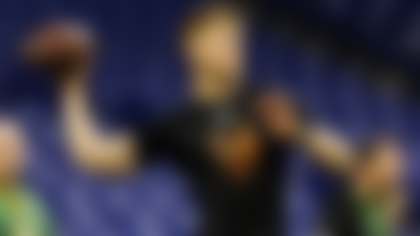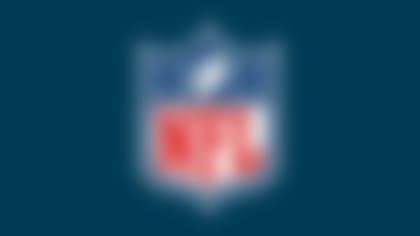MINNEAPOLIS -- Peyton Manning had another brilliant performance Sunday.
Drew Brees and Tom Brady can pad their respective portfolios of brilliance Monday night.
Fine.
I'm going to say it anyway: Brett Favre should be the Most Valuable Player of the NFL. Close the voting. Count the ballots.
Favre is, or should be, a lock to win the award for the fourth time in his career.
He's helped lead the Minnesota Vikings to a 10-1 record by throwing 24 touchdowns compared to three interceptions, and if that doesn't seal the argument, then the fact he's putting up those eye-popping numbers at 40 years old should. That should be the strongest argument of all. Doing this at 40 is crazy. It does not compute. It simply is not supposed to happen.
Great quarterbacks, like great players at most other positions, tend to stop being great when they reach their late 30s. Their bodies don't hold up. The pocket starts feeling like a broom closet. Making plays becomes less important than avoiding contact.
That's what allows the age argument to trump all of the arguments for Manning, Brees, Brady, Chris Johnson, and anyone else you want to throw into the MVP discussion. They're the right age to be achieving greatness in this game. Favre was the right age when he won those three consecutive MVPs with the Green Bay Packers (1995-97).
Now, in his 19th season and with his fourth different team, Favre is at the age when all of the achievements of a long and distinguished athletic career are supposed to be admired, not enhanced.
"To be 40 years old and playing at a high level like that is pretty incredible because you haven't seen it anywhere," Vikings tight end Visanthe Shiancoe said. "He's playing at the highest level of his career. He's playing young. To have about 10 years on these other quarterbacks and making these types of throws and running around and getting open in the pocket, (the MVP) is within his own realm."
Added Vikings veteran offensive guard Artis Hicks, "I hate to use the age as a (factor in the MVP debate). But when you do consider his age, it is one of those things you kind of marvel at a little bit."
It's not just the collective result of 11 games. We're also talking about someone who has actually found ways to make himself a better player.
Consider what Favre did in the Vikings' first matchup of the season against the Chicago Bears on Sunday. He was 32 for 48 for 392 yards with three touchdowns and no interceptions. In six previous games against the Bears, all with the Packers, Favre was 1-5 with only two scoring throws and 13 interceptions. He is putting his ultra-thick mental files on each opposing coach and player to great use. He is able to instantly see things that quarterbacks with less experience can't see, such as coverages the Bears tried throwing at him Sunday that they hadn't used in a few of their previous games. Even then, Favre still has the physical tools to do something about it.
Overall, the league's all-time leader in interceptions is being remarkably careful with the ball while still making mammoth plays. That is the perfect illustration of progress, the kind rarely seen from a player allegedly well beyond the twilight of his career.
"Gray hair; that's about it," Bevell said. "There's not a play that we can't call. You can see us getting him out on the edge, rolling out and putting him on the move. I think you're worried more about his legs holding up than you are his arm at that age, and his legs are holding up great. He's done a great job of conditioning himself and continuing to work to get better."
Favre's late arrival to Vikings' training camp last August, due to a signing that followed his seemingly endless consternation over whether he wanted to come out of retirement, had raised some concerns about his physical shape. Early in the season, Bevell and coach Brad Childress designed their game plan and called plays to allow Favre to ease his way back into full playing form, aware that despite offseason surgery to repair a partially torn biceps, he still was dealing with a torn rotator cuff in his throwing shoulder.
"Obviously, now he's there," Bevell said.
Still, he has managed to exceed expectations. The Vikings thought he would be good. Yet, as one person close to the team said, no one in their organization expected him to be this good.
When Bevell was in Green Bay in 2005, Favre threw a career-high 29 interceptions. For a gunslinger like him to currently have only three in 11 games is beyond comprehension. That's the kind of ball protection that Manning, Brady and Brees would envy.
"I think he was a guy who was trying to make up for a lot of deficits that were on the team," Bevell recalled of the '05 version of Favre. "He was trying to do everything by himself, make plays that probably he didn't need to be making. And the great thing about this team is he has weapons around him where he just has to make the ordinary plays. He's going to make the extraordinary ones, but he just has to make the ordinary ones, and he's making them down in and down out."
Of course, that brings up the argument that anyone who doesn't believe Favre is the league's MVP is going to point to immediately: Look at what he has around him. He has Adrian Peterson, one of the best running backs the game has ever seen. He has game-breaking wide receivers in Sidney Rice and Percy Harvin, who is running away with the NFL's Offensive Rookie of the Year Award. He has a rock-solid offensive line. He has a smothering defense, led by end Jared Allen, who continues to build his case for league Defensive Player of the Year.
Sure, Favre has an impressive supporting cast. Sure, the Vikings won 10 games without him last year. However, they are a far better team with him. There is no comparing Favre with their other quarterbacks, Tarvaris Jackson and Sage Rosenfels. Neither Jackson nor Rosenfels would be making the plays that Favre is making -- because he is a one-of-a-kind, freakish talent.
The fact is, as much as the surrounding talent does plenty to help Favre, he is doing every bit as much to help the surrounding talent.
"When you look at what he's doing -- the reads he's making, the throws he's making -- he's elevating everybody around him," Hicks said. "He's elevating the receivers as far as how they're playing. Sidney Rice is coming on. I know Sidney Rice is having the type of year he is because of the hard work he has put in, but he's got a quarterback that understands how to get him the ball -- throw the ball high where only he can get it because he's a tall, lanky guy; hitting him in stride where he can use that long stride to his advantage.
"We were a good team last year, 10-6 and went to the playoffs. Not taking anything away from Tarvaris or Sage, but with (Favre's) presence and his knowledge of the game, he's able to see things a little bit better and make a little bit better decisions in the passing game. Fifteen and 20 completed passes is the difference between winning and losing in this league."
It is that difference, quite possibly, that could determine whether the Vikings claim the top playoff seed. With or without it, they are a team that continues to look like a strong Super Bowl contender. They look exactly like what Favre was searching for when he decided to play for a 19th season: The chance to win a second Vince Lombardi Trophy.
"We were his missing piece, along with him being our missing piece," Shiancoe said.
All of which adds up to Favre receiving another piece of MVP hardware.



